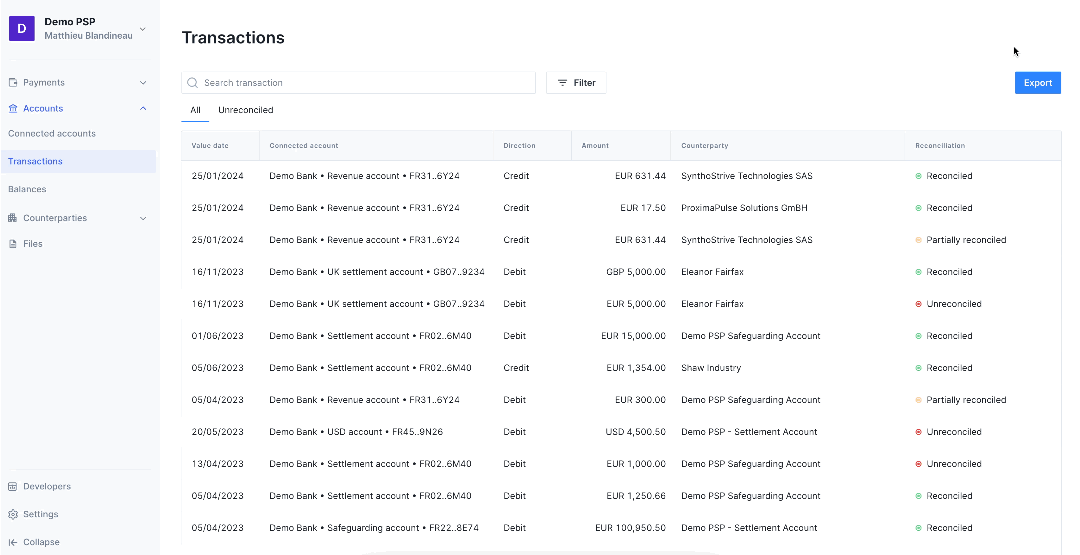Reconciliations
Use Mambu Payments (formerly Numeral) to reconcile transactions posted on your bank accounts
As transactions are posted on your bank account, Mambu Payments automatically reconciles them with unreconciled payments, based on their respective attributes. Transactions can also be reconciled manually using the Numeral API or web app.
A reconciliation takes the form of a Reconciliation object and always reconciles a single payment with a single transaction. Multiple reconciliations can be created to reconcile a single payment with multiple transactions or multiple payments with a single transaction.
The types of payments that can be reconciled are:
Automated reconciliation engine
Mambu Payments automatically reconciles payments and transactions. You can use the default reconciliation engine or setup custom reconciliation rules. A reconciliation rule has a type (one-to-one or one-to-many) and criteria, which include:
- Amount (mandatory)
- Direction (
debitorcredit) (mandatory) - Date
- Connected account
- Counterparty information (name, account number…)
- Transaction category
- Description (or reference)
- Virtual account used
- Direct debit mandate reference
- Technical IDs (e.g.
end_to_end_idormessage_id) - Metadata
Criteria can be combined to create a reconciliation rule. Reconciliation rules are ranked. The engine goes through reconciliation rules, based on their rank. The engine automatically stops when a reconciliation is created.
Example: a customer creates the two following reconciliation one-to-one rules:
- Rule #1 based on
dateandvirtual account - Rule #2 based on
dateandmandate reference
As a result, a new transaction is reconciled with a payment, if:
- Rule #1: their
amountanddirectionanddateandvirtual accountmatch OR - Rule #2: if their
amountanddirectionanddateandmandate referencematch
Manually reconcile a payment with a transaction
It can happen that Mambu Payments is not able to automatically reconcile one or multiple payments. When this happens, you can use the Mambu Payments API or dashboard to manually create a reconciliation.
From the dashboard
Reconciliations can be created from the following screens:
- Transactions
- Payment orders
- Incoming payments
- Returns
- Expected payments
- Payment captures

One-to-one and one-to-many reconciliations are supported in the dashboard.
Create a reconciliation from a payment
- Go to any payments screen (payment orders, incoming payments, returns, expected payments, or payment captures)
- Select an unreconciled payment and click on Reconcile
- Select one or multiple transactions to reconcile the payment with. Use filters to find relevant transactions
- Click on Reconcile
Create a reconciliation for a transaction
- Go to Transactions
- Select an unreconciled transaction
- Choose the type of payment to reconcile the transaction with
- Select one or multiple payments to reconcile the transaction with. Use filters to find relevant payments
- Click on Reconcile
From the API
Use the Create reconciliation API endpoint to create a reconciliation:
curl --request POST \
--url https://sandbox.numeral.io/v1/reconciliations \
--header 'Accept: application/json' \
--header 'Content-Type: application/json' \
--header 'X-API-Key: YOUR_API_KEY'
--data '
{
"payment_id": "ae14358d-e8bf-4d29-8367-50dd23782c83",
"transaction_id": "eb6bc39b-73a5-401f-997b-138d84514c44",
"amount": 120
}
'The API will return:
{
"id": "7d399984-b435-4a63-ab11-4a4185c13cba",
"object": "reconciliation",
"amount": 120,
"match_type": "manual",
"transaction_id": "eb6bc39b-73a5-401f-997b-138d84514c44",
"payment_id": "ae14358d-e8bf-4d29-8367-50dd23782c83",
"payment_type": "payment_order",
"metadata": {},
"canceled_at": null,
"created_at": "2023-08-09T12:17:07.48448Z"
}If you need to reconcile a payment with multiple transactions or a transaction with multiple payments, you should create multiple reconciliations.
You can list the reconciliations related to one transaction or one payment using the List all reconciliations feature, passing the transaction ID in the transaction body parameter or the payment ID in the payment body parameter.
Reconciled amount
As a payment or transaction gets reconciled, its reconciled_amount is computed and updated.
Reconciliation status
As payment and transactions are reconciled, their reconciliation_status is updated:
| Reconciliation status | Logic |
|---|---|
unreconciled | reconciled_amount = 0 |
partially_reconciled | amount > reconciled_amount > 0 |
reconciled | amount = reconciled_amount |
excluded (for transactions only) | Will not be reconciled or appear as unreconciled |
Cancel a reconciliation
To cancel a reconciliation, click on "… > Cancel reconciliation" or use the Cancel reconciliation API endpoint. Reconciliations canceled are excluded from the automated reconciliation engine.
Updated 4 months ago
